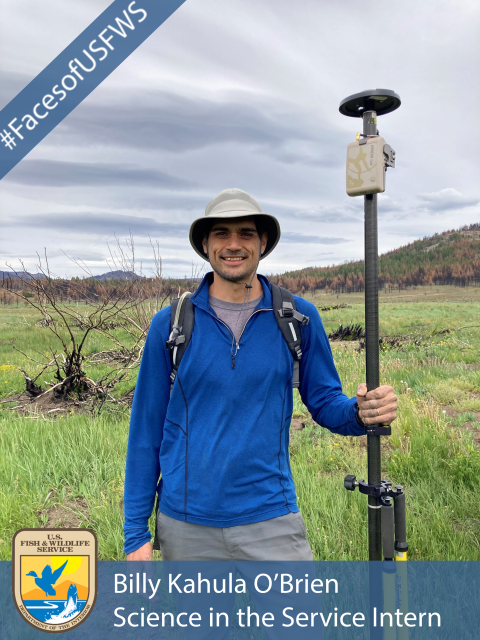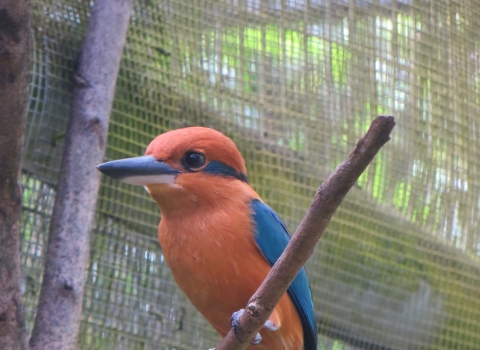Meet Science in the Service intern Billy Kahula O’Brien! Billy tells us about his conservation hero describes a project from his schooling that makes him proud. Learn more about Billy in our latest Faces of the Fish and Wildlife Service interview!
Olivia Beitelspacher: Welcome to the Ventura Fish and Wildlife Office, Billy! What role do you play within the agency?
Billy O’Brien: My primary role within the agency is the development of a geodatabase of California tiger salamander habitat, finding and documenting existing land use types that are within proximity to known salamander breeding ponds throughout Santa Barbara County.
OB: What led you to a career with the U.S. Fish and Wildlife Service?
BO: I learned about the opportunity to work as an intern with the U.S. Fish and Wildlife Service through the Hispanic Association of Colleges and Universities. They were looking for someone to work remotely using Geographic Information System (GIS) related tools, so it was the perfect opportunity for me to work with the Ventura Fish and Wildlife Office since I live in the San Francisco Bay area.
OB: We’re glad to have you on our team doing such important work! What are you studying in school?
BO: I received my undergraduate degree in geography from the University of Hawaiʻi and am currently working on my master’s degree focusing on geographic information science at San Francisco State University.
OB: Do you have any conservation heroes?
BO: My conservation hero is Rosalie Edge. After learning about her role and influence in the conservation movement nearly a century ago, I thought she must have been a very influential and effective advocate for species protection given the environment she was in at the time. Someday, I would also like to visit the Hawk Mountain Sanctuary that she helped establish..
OB: She is a truly inspiring person! Is there a project from your schooling or career that makes you really proud?
BO: I was in the hiking club during high school and we were fortunate to visit the island of Kahoʻolawe in Hawaiʻi. We learned so much about its history and helped to replant native vegetation on the island. There is still lots of work to be done but I feel good knowing I contributed to the spirt of the place, and that my work will help the native plant and animal communities that find sanctuary there.
OB: Wow, that sounds like such a special and impactful experience! What is your opinion on the importance of diversity in conservation?
BO: I feel diversity in conservation is important because it speaks to our interconnectedness as both humans and living beings with the world around us. From an ecological perspective it shows that we are all important pieces holding up the system together.
OB: That is so true. We are all connected, and we each have an important role to play. What are your thoughts on the concept that “the outdoors is for everyone”?
BO: I agree with the concept that the outdoors is for everyone. Given our differences in proximity or other socioeconomic factors, it is something we strive for in our work. And knowing how I have benefited from outdoor spaces growing up in Hawaiʻi, the ability to find reciprocal connection and nourishment with the land should be available to all.
OB: I agree, the outdoors should be a place where everyone can find peace and enjoyment. How do you spend your free time?
BO: In my free time I like to garden and read. I enjoy going to the park with my daughter and when everyone is up to it, we have some nice trails in a natural area near our home where we like to hike together and get some good views of the bay.
OB: Family hikes are the best! Do you have a hidden talent?
BO: I like to play the accordion, not much of a talent yet since I am still learning but I have a couple of songs I can play.
OB: That’s so impressive! I’d love to hear you play someday. Thank you, Billy!




